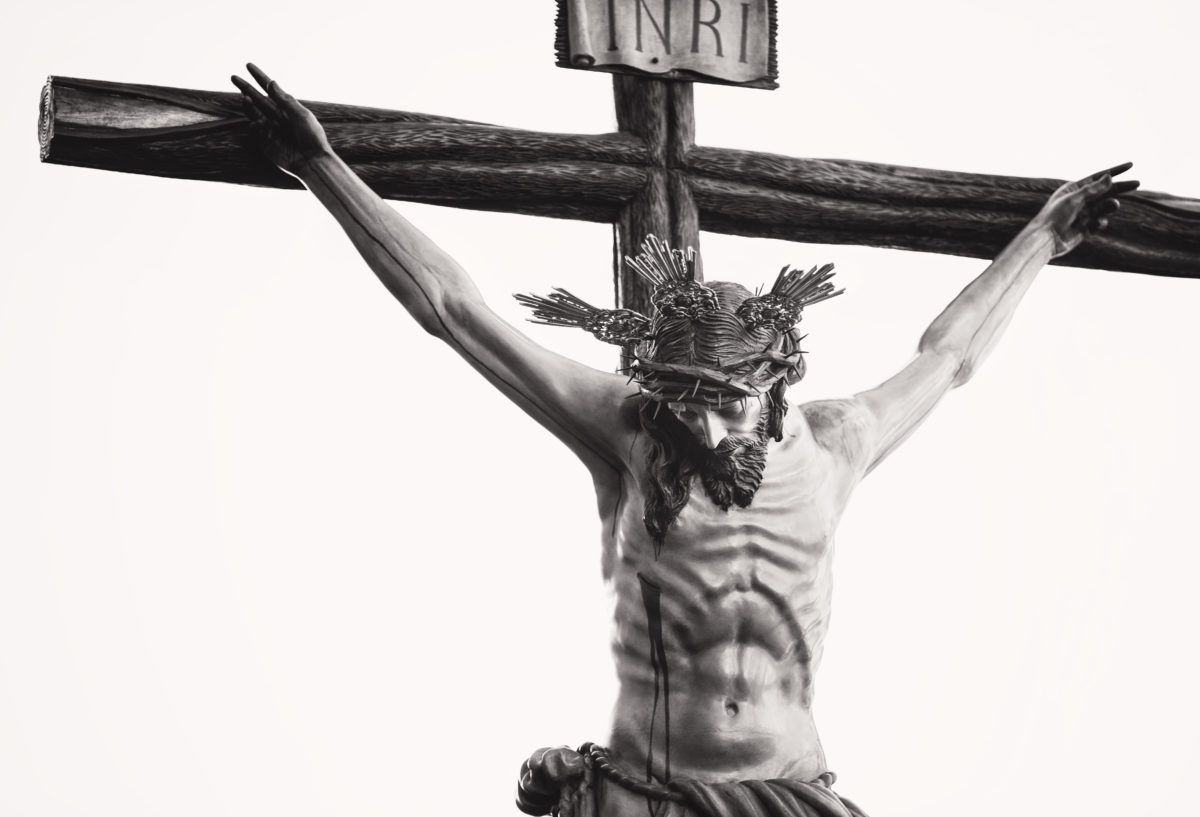
This is the seventh in a series of reflections through the season of Lent, written by Bobby Gross, who contributed the reflections for this past Advent Season. The first appeared on Ash Wednesday. You can browse the second, third, fourth, fifth, and sixth reflections by following the links.
The whole journey of Lent brings us to this weekend, holy in the Christian calendar, the Great Three Days, the Paschal Triduum, this Good Friday–Holy Saturday–Easter Sunday that plunges us into the dark mystery of the cross and the bright glory of the empty tomb. Everything hinges on what these three days point to in human and cosmic history.
On Ash Wednesday some six weeks ago, we acknowledged our human condition before God and to ourselves: we are mortal and vulnerable creatures, we are immoral and sinful persons. We remembered that we are dust, we were marked with the ashes of repentance.
Over the weeks of these Lenten reflections, we have considered the ways we are tempted in our human experience, as Jesus himself was tempted: to greedily strive for money with all the security and comfort it can bring, to pridefully think of ourselves as self-sufficient and better than others—especially others different in “race” or “class” from us, or to put too much stock in our tribe or party or nation—all of these dangerous for the way they undermine our allegiance to God or our love for neighbors.
But despite our best efforts to reform ourselves and live morally good lives, we fall short. We all fall short. We cannot live up to our own expectations for ourselves, much less God’s expectations for goodness and holiness and justice. We cannot fix ourselves, we cannot declare ourselves forgiven, we cannot save ourselves.
And so the journey leads us to this Friday and the starkness of the cross.
The crucifixion makes us uncomfortable, to say the least. To read the gospel accounts, to let our imaginations fill out the scenes, is to contemplate the obscene. Cruel, humiliating, dehumanizing torture and execution of a human person by others under the authority of the state. I remember watching the movie The Passion of the Christ, directed by Mel Gibson, which portrays the crucifixion with excruciating vividness. I was moved and horrified, tearing up and turning away; I have not wanted to watch it again. Too much.
Too much indeed. However assiduously we try to grasp the meaning of the cross—careful exegesis, volumes of theology, all the sermons and songs—we cannot fully comprehend its enormity. Words and concepts and metaphors help (atonement, justification, redemption, reconciliation, ransom, Christus Victor’) but we never reach the bottom of the mystery.
Here is British writer Francis Spufford’s stab at it:
[Jesus] is turning his bruised face toward the whole human crowd, past and present and to come, and accepting everything we fear we deserve ourselves. The doors of his heart are wedged open wide, and in rushes the whole pestilential flood, the vile and roiling tide of cruelties and failures and secrets. Let me take that from you, he is saying. Let me carry it. Let me be the blame instead.
He cannot do anything deliberate now. The strain of his whole weight on his outstretched arms hurts too much. The pain fills him up, displaces thought, as much for him as it has for everyone else who has ever been stuck to one of these horrible contrivances, or for anyone else who dies in pain from one of the world’s grim arsenal of possibilities. It is not what he does, it is what he is. He is all open door: to sorrow, suffering, guilt, despair, horror, everything that cannot be escaped, and he does not even try to escape it, he turns to meet it, and claims it as his own.[i]
We don’t like that Jesus had to die in this way to save us, to make the forgiveness of our sins and sinfulness possible, that God’s love for us required God’s self-sacrificing suffering and death. We can’t comprehend that we are that bad nor that God is that good. Like Peter at the last supper, we are not sure we even want Jesus to wash our feet.
But that’s what Jesus does. This is how he loves those that are his, loves them to the end.
Jesus, knowing that the Father had given all things into his hands, and that he had come from God and was going to God got up from the table, took off his outer robe, and tied a towel around himself. Then he poured water into a basin and began to wash the disciples’ feet (John 13:3-5a).
Jesus, who, though he was in the form of God, did not regard equality with God as something to be exploited, emptied himself, taking the form of a slave, being born in human likeness, and being found in human form, he humbled himself and became obedient to the point of death, even death on a cross (Philippians 2:6-8).
This is how he loves us.
[i] Unaplogetic (Faber and Faber, 2012), p. 144-146.
Bobby Gross is the author of Living the Christian Year: Time to Inhabit the Story of God (InterVarsity Press). Bobby has spent his career in campus ministry with InterVarsity Christian Fellowship. He currently serves as Senior Field Director for the Graduate & Faculty Ministries division. For 13 years he served as VP and National Director for Graduate & Faculty Ministries. Originally from Columbus, GA, Bobby and his wife Charlene have lived in Miami (FL), New York City, and now Atlanta. He graduated from UNC Chapel Hill with a B.A. in American Studies and English Literature and did additional studies in theology at Regent College in Vancouver. Bobby served on the national board of Christians in the Visual Arts (CIVA) for six years. An admitted bibliophile, Bobby also writes poetry and collects contemporary art on religious themes.

Leave a Reply